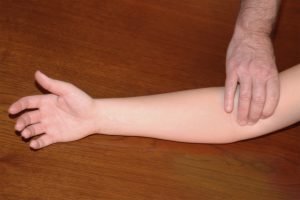Chapter 3: Pulse and Respiration
Brachial Pulse
Brachial pulse rate is indicated during some assessments, such as with children, in whom it can be difficult to feel the radial pulse. A Doppler can be used to locate the brachial pulse if needed.
Technique
The brachial pulse can be located by feeling the bicep tendon in the area of the antecubital fossa. Move the pads of your three fingers medial (about 2 cm) from the tendon and about 2–3 cm above the antecubital fossa to locate the pulse. See Figure 3.4 for correct placement of fingers along the brachial artery.

Figure 3.4: Correct placement of fingers
What should the healthcare provider consider?
It can be helpful to hyper-extend the arm in order to accentuate the brachial pulse so that you can better feel it. You may need to move your fingers around slightly to locate the best place to most accurately feel the pulse. You will usually need to press fairly firmly to palpate the brachial pulse.

